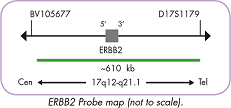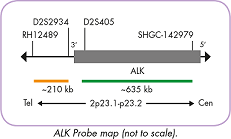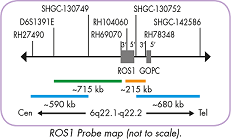FlexISH® FISH
FlexISH® products are designed for identification of chromosomal aberrations on various specimens by Fluorescence in situ Hybridization (FISH). Using the FlexISH® products gives you the flexibility to choose between a 1-day (2 h hybridization) or a 2-day (overnight hybridization) protocol by adapting the hybridization time just according to your individual needs!
FlexISH® brings Flexibility to Your FISH
- FlexISH® maximizes your flexibility in terms of time and laboratory management. Hybridization time can be varied between 2 hours and overnight.
- With a hybridization temperature of 37°C the FlexISH® protocol is fully compatible with routine workflows in pathology laboratories.
- In a recent comparison study, overnight and short hybridization periods showed excellent correlation between the FISH results obtained with FlexISH®, ZytoLight®, and PathVysion ERBB2 probes.
- Short hybridization time does not negatively affect the performance, specimen quality or diagnostic result.
FlexISH® ERBB2 / CEN 17 Dual Color Probe
The FlexISH ® ERBB2/CEN 17 Dual Color Probe is designed for the detection of ERBB2 (a.k.a HER2) gene amplification frequently observed in solid malignant neoplasms e.g. breast cancer samples.
Amplification of the proto-oncogene ERBB2, observed in approximately 20% of all breast cancer samples, has been correlated with a poor prognosis of the disease. In addition, detection of ERBB2 amplification by FISH may help in selecting patients eligible for ERBB2-targeted therapy.
DATASHEET DOWNLOAD HERE

FlexISH ® ALK / ROS1 DistinguISH Probe
The FlexISH ® ALK/ROS1 DistinguISHTM Probe is designed to detect rearrangements involving the ALK (anaplastic lymphoma receptor tyrosine kinase) and ROS1 (c-ros oncogene 1) gene, respectively. Using this probe, it is possible to simultaneously detect ALK and ROS1 rearrangements and, additionally, to discriminate between possible aberrations affecting these chromosomal regions.
Both, the ALK as well as the ROS1 gene, encode for transmembrane receptor tyrosine kinases. Rearrangements affecting the ALK or the ROS1 gene locus are frequently found in non-small cell lung cancer (NSCLC). ALK and ROS1 positive NSCLC patients benefit from a tyrosine kinase targeted therapy, like, e.g., crizotinib.
DATASHEET DOWNLOD HERE










